#laomedon
Text

The Trojan royal family tree*! (*Almost complete! I'm sure you'll forgive me for the oversight of not including all of Priam's children, either by Hecuba or other secondary wives/concubines.)
You're going to want to full-view; as complicated as this one is I didn't want to make it smaller and then make it harder to read. (Though even full view doesn't fully help so I'll try to summarise under the cut:)
-Helen and Paris' children aren't part of any main tradition, and neither is Oxynios, mentioned by Konon, but I wanted to include them!
-Eriope is named as the mother of at least Hippodamia in Iliad scholia (here made the mother of all Anchises' non-demigod children).
-Eurydike, daughter of Priam and Hecuba, is named this in the Kypria; otherwise known as Kreusa.
- The genealogy for Lakoon comes from Hyginus' Fabula 135.
-Eioneus is named by Pherekydes as the son of either Proteus (the sea god) or Sangarios. Obviously I chose Sangarios.
-Tenes is the son of Proklia and Apollo, with Kyknos is nominal/mortal father.
-Batia has no named mother, so while she might be a nymph or the daughter of one, I didn't colour her circle as such, since we can't know.
-Elymos and Aineias' two daughters are mentioned in Roman Antiquities by Dionysios of Halikarnassos.
-Ploutus is divine, while his brother Philomelos is mortal.
33 notes
·
View notes
Text
*In my fic Save Me, 'Cuz I'm Fallin'*
Apollo: Oh wow, Proclia was so nice to give me water that one time she didn't have to be so nice :)
Apollo: I'm gonna get Hymenaeus to make sure she's married to a good man because her dad's a piece of shit.
Apollo, in a few years or so: *trips his way into fallin in love with her* oh wow I did not see this coming haha
#my incorrect quotes#save me 'cuz i'm fallin'#apollo#proclia#apollo x proclia#laomedon#poseidon#the trials of apollo#greek mythology#troy
23 notes
·
View notes
Text
LesbianX - Hot AF Brunettes Play, 1st Anal For Violet Starr
My school secretary
Big round ass doggy fuck
Tiny boy gay vids and of grandpa fucking young boys Trick Or Treat
Blue haired Emo tomboy Ebba aka Amy Frost wild hardcore
brisbane casino construction jobs
Pretty student pounded in bdsm
winstar world casino and resort 777 casino avenue thackerville ok 73459
Fingering pussy hot girl
Open legs school girl Giselle gets her pussy eaten out and fucked
#tempest-clear#scall#lignitiferous#catphoto#merribush#Lonie#palaverer#brigade's#Mogans#brilliantined#varicotomy#Laomedon#acupress#culilawan#sojin#uncandid#annal#nonsociability#eyewashes#nonmiraculously
0 notes
Text
(1 of 2 fics)
Merry Christmas ToA fandom!!!
I [@firealder2005] was given @literallyjusttoa this year, and this fic is based off her prompt of Poseidon and Apollo bonding time!!!
I will have the fic up on my Ao3 once the submission is posted :3
Warnings: Just to be safe, I have the fic rated M for implied noncon because. well. Ancient times be ancient times, you know?
This was meant to be combined with the other fic I have but uh. I got carried away lmao
Let us begin!
Save Me, ‘Cuz I’m Fallin’
A soft curse left his lips as he adjusted his grip on the stack of bricks in his arms. Apollo blew a puff of air towards a curl of hair that had fallen into his eyes, warily scanning the people around him as he set his bricks down. He tucked that free strand back behind his ear, wiping his dusty, achy hands on his tunic as the slowly-growing wall before him casted a long shadow over him, the sunset looming from behind.
“Hey!” Apollo slightly jumped as a hand clamped down on his shoulder, roughly spinning him around. One of the guards stationed around the wall glared at him, eyes partially obscured by the helmet on his head. Apollo wondered why people wore those if they obstructed their view. It was terribly constricting.
The guard shook him again. “The king demands your presence. He’s not happy with you.”
Apollo swallowed and began surreptitiously looking for his one and only ally within these ever-growing, ever-entrapping walls — Poseidon. In the years he’d been quite literally slaving away in Ilios, he always felt a lot more comfortable dealing with its king without the older, formidable god at his side. Even if at times there wasn’t much Poseidon could do…
Apollo was thankful to catch sight of his uncle. Poseidon’s hair had grown unruly during their punishment, yet he was still able to cut an imposing figure through the polis as the slaves of Ilios were finally able to pause their back-breaking work and rest.
“Come on!” The guard grabbed his arm and yanked him forward. Apollo stumbled, the sandals on his feet slipping over the pebbles beneath them, and the guard snorted as he fell onto his knees. “Get up!” he barked, the fold of his cape snapping as the former god staggered back to his feet. “We don’t have all night!”
Apollo ducked his head and mutely nodded, wincing a bit as the scrapes on his knees stung. A quick look told Apollo they would heal within seconds, but it did little to reassure the nervousness growing in his throat. Gods, he hated it when Laomedon called for him…
He attempted to swallow the lump. No luck.
Glancing almost desperately over his shoulder, Apollo managed to catch Poseidon’s eye and gave him his best HELP! LAOMEDON WANTS TO TALK TO ME! look. It must have translated quite well, for Poseidon began shoving his way through the dwindling crowd and stormed after Apollo and the guard, who still had not removed his adamantine-grip from his arm. Rude.
“You! Guard!” His uncle’s voice boomed through the air. A slave he may be now, but nothing could ever take away the blood-freezing depths of his words. “Where are you taking my nephew?”
The guard’s head had snapped around to face Poseidon, who loomed a good foot taller than the Dardanian. Despite the angry behemoth before him, the guard clearly had a nice stash of bravery somewhere within him — or he was stupid, depending on your point of view.
Personally, if Apollo had been on the receiving end of the furious stare Poseidon was giving this Dardanian, he would have scampered out of the way faster than Arion could run.
“Your indolent nephew,” the guard sneered. “Is to come to the king. He has some words to share with him.”
“Very well,” Poseidon tersely replied, eyes storming like the Adriatic Sea on a bad day. “Lead the way.”
The guard hesitated, his grip on Apollo’s arm loosening a bit, much to his relief. He pulled it out of his grasp and hid a wince at the twinge that shot up to his shoulder. Thanks a lot, he grumbled, rubbing at the blossoming bruise. Not like that’s gonna make carrying bricks even more of a pain or anything…
Then again, he healed fast. Maybe he wouldn’t have to deal with a stinging arm in the morning.
Though…Apollo nervously folded his hands together as the Dardanian guard jerkily motioned for him and Poseidon to follow. By the attitude of the guard, he clearly didn’t think Apollo would exist when Eos decided to paint the sky pink with her fingers.
Apollo kept his eyes fixed on the dirt below, ignoring the sleepy city around him. He stifled a yawn that pulled at his throat, and jumped when Poseidon nudged his shoulder with his own.
“You good?” he murmured under his breath, eyeing the guard marching before them with an intense look of dislike.
The younger god nodded, shakily inhaling as he muttered a “yes” in response.
“Tired?”
“As always.”
A ghost of the jovial grin Apollo remembered appeared on his uncle’s face. “Just remember — once that stupid wall is done, we’re out of here.”
Apollo felt his own lips curl into a smile just as the guard quickened his pace and entered the throne room. Yeah, he couldn’t wait for this stupid punishment to be over. Apollo swatted at the sheer curtains hanging from the doorways, tensing as he spotted the king of Ilios seated on his throne, fingers tapping the armrest ominously.
“The slave you ordered, sir,” the guard bowed.
Laomedon barely gave Apollo a glance. “Why is he here?” He idly lifted a finger to point at Poseidon, who crossed his arms and glared at the king.
The guard cleared his throat, mouth opening as he clearly scrambled to explain how he was cowed into letting Poseidon in, when the king sighed and waved him away.
“Nevermind,” he inspected his nails. “Just go.” The guard quickly bowed once more before shuffling off.
Apollo clasped his hands before him and kept his gaze on the three steps leading up to the throne as Laomedon’s stare finally declared him entertaining enough for attention.
“So,” the king idly leaned forward, eyes fixed on Apollo. It made him distinctively uncomfortable. “I read the recent report on my wall’s construction.” A beat passed. “And I saw something…rather disappointing.” Laomedon rose from his throne and stood at the top of the stairs. “You do remember why your father made me your master, correct?”
Apollo silently nodded as Poseidon’s glare darkened.
“Good,” Laomedon took a step down. His voice darkened. “Then why,” Another step. “Are you failing,” His robes swished as he took the final step. “To meet your assigned quota?” The king’s scowl was harsh, burning into Apollo’s skin as he bit his lip.
“I–I,” Apollo stammered. Damn, he knew this was going to come back to bite him! “I know, I was supposed to get it done by today but I had to cover Aeacus’s quota too—”
“Quiet,” Laomedon’s eyes were still dark as Apollo’s jaw snapped shut against his will. “I don’t want excuses, Apollo. Zeus said to make sure you and Poseidon learned your places in the presence of a king, and that is exactly what I shall do.”
Apollo gulped and tried to hold back a tremor as Laomedon’s ruthless gaze pinned him down. “And this isn’t the first time you’ve been late,” Apollo dropped his gaze from Laomedon’s. “I let those be then, because I thought perhaps you still needed a little extra time to learn. Apparently I was wrong.”
Laomedon’s face split into a smirk. “Come here,” he snapped to the empty space in front of him. “Now.”
In less than a second, Apollo moved to obey. He gritted his teeth, once again attempting to fight against the compulsion, but like every single time before, it was no use.
A hand flashed out and grabbed his shoulder, pulling him to a stop. Poseidon’s gaze was as sharp as a shark’s as he stared Laomedon down. “No. He can stay right here to listen to what you have to say.”
Laomedon tutted. “Poseidon, let him go and stay put. Apollo — come here.”
Jerkily, Poseidon’s hand released Apollo and the younger god attempted to shoot his uncle with an assuring smile. He feared he only managed a grimace.
Taking a steadying breath, Apollo rolled his shoulders back and approached Laomedon, who was still smirking at his fuming uncle before snapping his dark eyes to him. The way the king steepled his fingers gave him an eerie resemblance to Zeus.
Of course, Apollo reflected as he steadily met Laomedon’s self-satisfied stare. He doesn’t quite have the intimidation factor down nearly as well. Though he had to admit, the way the king’s eyes flashed at Apollo’s nerve to meet him eye-to-eye was also very reminiscent of Zeus.
Apollo didn’t know if he meant it as a compliment or not.
Laomedon sighed, as if Apollo had caused him immense stress and disappointment. He tipped his head and clucked his tongue. “Now all that’s left is to find a proper punishment for you.”
The god recoiled at that, but Laomedon didn’t let him get far. He snatched the front of Apollo’s tunic and yanked him back toward him and grabbed his chin. “Since the wall isn’t tough enough work for you, perhaps a few months tending my lovely fields? By yourself?”
The ichor in his veins turned to ice. “That’ll take forever!” he protested.
“The winter months are almost upon us,” Poseidon added. Apollo couldn’t see his face, but he knew his uncle must be thunderous by the dark rumble of his words. “Not only would it be impossible for Apollo to accomplish alone, even with his lyre, but it would deprive your people of much-needed food the next year. Surely you’d know this.”
Laomedon’s eyes glanced behind Apollo, where Poseidon presumably was, hands still tight on Apollo’s tunic and face. He hummed. “I suppose,” he shrugged. “I would hate to have to punish my people because of you, Apollo.” The king’s brow furrowed, as if contemplating his choices. Personally, Apollo didn’t think it was a very good look on him.
Then the king got a wicked gleam in his eyes that also wasn’t a good look on him and set Apollo on edge.
“Of course…” Laomedon nearly purred and wow, his grandmother Rhea’s lions would be offended by how bad he made it sound. The king’s lips curved, a cruel tilt to his head, as he bared his teeth in a grin. “I could just sell you. Though I’d hate to be deprived of your company…”
A sharp inhale was sucked into Apollo’s lungs just as Poseidon let out a snarl.
Laomedon tilted Apollo’s head from side to side. His brows furrowed once more, though in a way that was like a lazy housecat able to play with an exhausted mouse at its paws. “You would fetch a fine price with that pretty face…”
The heart in his chest cavity thumped like a lone, rabid wolf ready to lash out to defend itself from a band of hunters. Apollo swallowed and shook his head.
“Believe me, I wouldn’t,” he nervously laughed. Under any other circumstances, he actually would have been quite offended at the idea that he wouldn’t be worth a lot of drachma, he was a gorgeous, talented god after all thank you very much, but he didn’t fancy getting tossed in the amphora and haggled over like livestock either. “Like you said, I’m awful at work — who’d want a slave who can’t work?”
“They would if they were a god,” much to Apollo’s growing horror, Laomedon seemed to actually be considering the idea, like actually thinking about it. “I’m sure Zeus would understand that you needed a harsher hand.”
“Absolutely not,” Poseidon interjected, his own scowl as harsh as the suggestion Laomedon had put forth. “First of all, my brother assigned us to you — he would not approve of you selling Apollo off. Secondly…” the older sea god drew himself to his full height and pinned the king with a raging stare. “I will not let you. You try it, and I swear I will kill you myself.”
Apollo hardly dared to breathe as slave and master — or god and mortal, he reminded himself — stared each other down. Poseidon’s face was simultaneously as stony as the walls of Ilios itself, and as wrathful as the seas he ruled. He was a true contradiction, and one not to cross.
Laomedon seemed to have realized that himself. His jaw ticked, eyes narrowing with a hint of…unease, perhaps? Wariness?
A cruel master Laomedon may be, but at least he wasn’t a stupid one. Poseidon would have killed him long ago if he had been.
“Then tell me, Poseidon,” Laomedon sounded equally irritated and irate. “What should Apollo’s punishment be?” The unease in his dark eyes was replaced with a brief flash that instinctively made Apollo wary. “Perhaps serving me more…directly in my palace?”
Apollo scowled. “I’d rather fight Python again.”
“Not to mention,” Poseidon called. “We’ll be down a worker for the walls — you said you want them built within a year, yes? Taking Apollo away from it would slow production.”
Laomedon gave a long sigh, absently brushing his thumb over Apollo’s cheek as he gave Poseidon a look.
“Well, since you’re so interested…” Laomedon released Apollo’s jaw — much to the god’s relief — but kept his grip on his tunic. The younger god attempted to subtly rub at his chin as Poseidon drew forth, the salty scent he carried with him drifting around Apollo. He inwardly breathed a sigh of relief at his uncle’s closeness.
“You can decide,” the king triumphantly declared. The relief Apollo felt was instantly squashed, and he stared with wide eyes first at Laomedon, then at Poseidon. His uncle had tensed, jaw clenched as he glared at Laomedon with nothing but pure dislike. “But of course,” Laomedon added slyly, finally relinquishing his hold on Apollo’s tunic with a lazy shrug, flicking at a strand of golden hair. “I retain the right to deny it and proceed with my idea.”
A wail of despair welled in Apollo’s throat, though he thankfully managed to swallow it back down. Though maybe a whimper escaped in the process.
This was it. Laomedon wasn’t going to be deterred by threats of what Zeus would do to him. There was no way he was going to accept whatever idea Poseidon came up with, not if he could humiliate a god of Apollo’s caliber.
Apollo silently cursed his father for taking off with Laomedon’s uncle. Why, oh why did Laomedon have to take his anger out on the most gorgeous god on Olympus? Was it because Ganymede had been snatched for his beauty and he was trying to make himself feel better by demeaning Apollo in such a way?
If so, he was so petty. Apollo hadn’t even been involved in that whole fiasco!
Poseidon had yet to say anything, his silence brewing a dangerous hurricane of potent emotions.
Laomedon, on the other hand, seemed to almost be enjoying himself. “We don’t have all night,” he tutted. “And I have a dowry to begin preparing for Proclia’s future marriage, so please do not waste my time.”
Apollo vaguely remembered Proclia. She was about thirteen, with long red hair and kind brown eyes. She had kindly given him some water one day when he’d been exhausted from brick-laying — much nicer than her pig of a father.
He hoped she was married to someone good. Though Laomedon didn’t seem to have an eye for such suitors. Maybe he could nudge Hymenaeus into helping…hmm…
Poseidon crossed his arms, face still shadowed with his storm, before he tersely nodded. “Very well. I suggest Apollo protect your cattle in the fields of Mount Ida. It’s been attacked lately by wild dogs, wolves, and other various beasts, am I correct?”
Laomedon frowned and tipped his head. “You are,” he agreed. “I have been losing the young cattle lately…ever since my father was king, anyway,” he added with a curl of his lips. Apollo winced and inwardly thought, Ganymede. The youth had used to protect Ilios’s herd of cattle…up until he caught Zeus’s fancy.
Apollo then arched a brow. Was it possible Poseidon was trying to appease Laomedon’s resentment of his uncle’s apotheosis with Apollo’s services in the very fields Ganymede had been taken from? He supposed it would be best to temper that anger…
…though did it have to come at the cost of him?
Laomedon, however, didn’t seem convinced. “Difficult that service may be,” he mused, fingers steepled once again. “I’m afraid I’m not quite satisfied with it. Any amendments to make? If not, I’ll be all too happy to get your nephew started on his new assignment.”
Assignment! Apollo scoffed, yet his hands shook at the possibility. He clenched them tightly as a low growl left Poseidon’s throat. “An amendment it is, then,” he clenched his own fists and sarcastically muttered; “Do you have any suggestions?”
The king thoughtfully hummed. “You know, perhaps I do.”
Poseidon blinked. Apollo tensed. Clearly, his uncle had meant the comment in jest, but Laomedon had not taken it that way.
“How about this…” Laomedon crossed his arms and studied the two of them. “Apollo works in the fields, protecting my prized cattle, while you, Poseidon, take on his work on the walls. I’m sure you can handle a double workload better than Apollo.” Apollo quietly huffed at the slight. “Aeacus is almost recovered from his bout of sickness anyway,” Laomedon continued. “So he can continue his third of the wall soon enough.” The king then raised a finger. “But the condition is that Apollo will also get the mortar and bricks you will build with…from my palace.”
Apollo glanced at Poseidon out of the corner of his eye. His uncle caught it. Despite his unease, Apollo knew this was the best deal they were going to get. He gave a slight nod — I can do this.
Poseidon inclined his head. “We accept the terms.” He announced.
Laomedon slyly smiled. “Good. Now go,” he pointed at the curtain-covered door behind them. “Best get some rest. You have work tomorrow.”
Work they had, indeed.
Over the months, as Eurus’s autumn winds turned away and allowed Boreas’s chilly breath to descend over Ilios, Apollo spent his mornings quickly gathering as much mortar and bricks as he could, thanking his godly strength that he was able to carry so much, dodging running into Laomedon in the process, and delivering it to Poseidon before rushing to Mount Ida and perching on an outcrop, keeping a careful eye on the cattle and the wintry woods around him. A few times he had to fend off a particularly hungry wolf before communicating to it about a much better place to hunt, with deer roaming despite these barren months. The little guy had given him a thankful nuzzle before darting away in the direction Apollo had pointed.
“Never seen a wolf do that, before,” a feminine voice made Apollo jolt and he spun around, still half-kneeling from where he’d been speaking with the wolf. A girl around his age — that is to say, his human age of eighteen — stood before him. Her pale hair was braided, like bundles of flax woven into a fine basket. Pearls sat in her braids. Her dark skin was clean. Her eyes were like pools of fresh, spring water. Her peplos a rosy pink, like Eos’s lovely dawn. “They usually growl when they see humans.”
Apollo self-consciously adjusted his straw hat, thankful the only thing marring his own visage was the occasional smudge of dirt, though that itself was minorly annoying when faced with a pretty girl.
“Well,” he modestly shrugged and rose to his feet, casually leaning against his shepherd’s staff. “I suppose that’s because most humans don’t have anything good to say.”
The girl considered him. “I suppose,” she nodded. “I wouldn’t know the first thing to say to a wolf anyway. I’d probably communicate something along the lines of ‘I want to eat your young’ instead of ‘Hello, my name is Ourea. What’s yours?’.”
Apollo cracked a grin. “Was that an indirect way of introducing yourself? And to get my name?”
The girl — Ourea, Apollo noted, a name meaning ‘mountains’, as well as the name of some of Gaea’s offspring — smiled and gave a modest shrug of her own. “Perhaps. Not everyday you meet a man who can speak wolf.”
“It’s sadly a lost art,” Apollo mock-sighed. “Very few are able to master such a skill.”
“Oh?” Ourea drifted closer and intently stared at him. Her eyes were very distracting. Apollo had never really paid attention to the beauty of water before, but wow. It definitely deserved a few odes, perhaps even a sonnet. The way the sunlight shone off her eyes…it was like marveling at a sunset over the sea.
“Care to teach me?”
Apollo smiled. “Wouldn’t hurt to try.”
Ourea was rather good company. She was in the field waiting for him when he came to watch the herd, and he would impart to her the language of wolves — their code, their way of life, and how they communicated. She had trouble with it at first, which was a given. Mortals weren’t usually interested in learning about each other, let alone an animal, but he was fascinated with Ourea’s determination to push through his lessons.
They met everyday. Winter began to wane. Poseidon would give him a sly look every morning he came to drop off the day’s delivery of mortar and bricks, and shot a shit-eating grin his way at night when he returned a bit more flushed than usual and his tunic ajar.
Some people would think it weird that Poseidon wasn’t objecting to Apollo dating his daughter — after all, fathers were supposed to want their daughters to actually be able to marry the man they were seeing.
Poseidon though wasn’t a mortal father. He rarely interacted with his children, though he lent a hand if they asked for it. When Apollo had inquired about his opinion, his uncle had merely shrugged and said; “If Ourea wants you, I see no reason why she can’t.”
Apollo had to admit. Ourea’s presence was becoming a particular bright spot in Ilios. Not only would she meet him in the meadow, but also at the walls in the mornings and watch as he passed the materials to her father, waving cheekily at him whenever he playfully wrinkled his nose at her.
One particular bright spot was a nice night between them the day the walls were finished. The formidable stones rose high into the air, fortifying the main city even better than the outer city’s walls did — because they were built by two gods, of course.
And maybe Apollo had helped speed the process up a bit by playing his lyre as the construction came close to the end. His godly power had been greatly reduced thanks to his punishment, but he’d been able to manipulate the bricks into their proper places, creating a strong barrier to protect Ilios’s people — people who included Ourea…and his own child now.
He still remembered the day she told him, breath lingering around his ear, eyes shining as she whispered; “I’m expecting!”
Poseidon had clapped him on the shoulder and congratulated both of them. And nine months later, Ourea failed to arrive in the meadow. Apollo spent the rest of the day anxiously pacing the field, his restlessness no doubt warding off would-be attackers, though few they were as Notus’s summer sighs began.
Apollo practically ran back to Ilios in his haste to find Ourea, and find her he did. Her mother was busy attending to her, while his lover sat up in bed, a bundle in her arms. Her hair was down and pearlless, but her smile was as bright as the sea’s gems.
“Ileus,” she said. “After our city.”
The god bent down and placed a gentle kiss first on Ourea, then on Ileus. “Perfect,” he murmured. “He’s perfect.”
He and Poseidon were still technically in Laomedon’s service, even with the walls complete. Thanks to their godly intervention, the walls were finished earlier than planned — which was good, for Apollo could pop in and visit Ourea and Ileus more often, but also irksome. He missed having his full godly power at his disposal. He could’ve properly helped Ourea’s birthing pains. He could’ve — would show Laomedon what happens when you treat not one, but two gods cruelly.
Though despite the disgruntlement and unease Laomedon put in him, Apollo made a silent promise to protect this city. Not all of its inhabitants were as demeaning as their king — most treated him and Poseidon with the respect gods of their caliber deserved, and very few had dared to belittle Ourea for having a child out of wedlock, not with the knowledge that Apollo had fathered him.
All in all, Apollo was in high spirits. The walls were done. He and Poseidon were about to get paid for their work once autumn came about. Ourea swore Ileus was trying to imitate a wolf’s howl the night before — bless his little soul, already taking after his parents!
The snakes put a bit of a damper on his mood, three months later.
It happened fast. The guards along the walls raised the alarm as three massive drakons rushed the walls. Apollo had been transfixed to the spot, unable to tear his eyes away as the first drakon rammed into Poseidon’s wall. It screeched when it failed to topple it.
The second attempted the same with Apollo’s wall. It too fell prey to its invulnerability.
Meanwhile the third…Apollo remained rooted to the ground as it crashed through Aeacus’s third of the wall. Stone crumbled. Mortar cracked. Ash was flung into the air as the drakon stomped through, roared triumphantly, before turning tail and charging away, its brethren on its heels, screaming like a battalion of armed warriors.
Faintly, Apollo heard Poseidon swear and sensed Ourea clutch Ileus to her chest, as if afraid the drakons would return and snatch him away. The baby’s bright blue eyes stared at the drakons in awe, his pale hair askew.
Equally as faintly, Apollo could hear the rumbles of stone falling, though the walls around him remained intact, except for Aeacus’s third. He could feel the tremors echoing through the ground, the clanging of bronze-on-bronze.
A war would be fought here. A great one.
Apollo’s smokey green eyes rolled back into his head and his breaths turned harsh;
“Unyielding walls, made of stone,
Heed my words and be known.
None shall shake your roots of steel,
But beware the tenth year.
Red-haired Pyrrus to pluck you down,
And Ilion will fall by Aeacus’s crown.”
Hands grasped his shoulders and shook. Apollo dazedly jerked his head, blinking with bewildered pale gold eyes at the creased face of Poseidon.
“Apollo,” his uncle’s dark green eyes were fixed on him with a serious, intent expression. “Apollo, was that…”
The younger god swallowed and nodded. “I believe so.” He breathed through his nose. “It was a prophecy.”
“A prophecy?” Ourea breathed, blue eyes as wide as the pools of water in Ilios’s forests. “But what…what could it mean?”
Apollo frowned, biting his lip for a moment as he considered the prophecy, absently snapping his fingers for a papyrus scroll and reed pen. He quickly scrawled the prophecy down, studying the words.
Prophecies were tricky things. They liked to make you think you figured them out, or successfully averted them, before pulling the rug out from under you. (Just ask Acrisius)
However…he squinted suspiciously at the words before him.
Unyielding walls, made of stone, heed my words and be known.
Apollo eyed the walls of Troy as citizens and slaves alike clustered around the broken wall, clamoring over each other about how to fix it.
None shall shake your roots of steel, but beware the tenth year.
Unease filled his stomach. Beware the tenth year…tenth year the walls were built? Or perhaps…
The sound of bronze weapons clashing and the ground cracking apart from an earthquake ripped through his ears once more.
No. Beware the tenth year of war.
Red-haired Pyrrus to pluck you down, and Ilion will fall by Aeacus’s crown.
The wall. The wall that fell…it was built by Aeacus, not a god. That made it the weakest point, the prime place for attack…
Or it meant —
Apollo shoved the thought away. No. No. Ilion couldn’t…
“Apollo?” Poseidon asked. “Do you know what it means?”
The younger god glanced between the intense eyes of his uncle and the anxious ones of his lover.
“I have…a suspicion,” he admitted. He met Ourea’s worried face and softly said; “I think it says the walls will fall…and so will Ilion.”
Ourea pressed a hand to her mouth, eyes widening as she held Ileus tighter, making him whine as he attempted to wiggle out of her hold, making grabby hand at Apollo. He held out his fingers and allowed Ileus to snatch them, lips curving slightly as the boy attempted to stick them in his mouth.
Poseidon had turned and stared consideringly at the walls. Apollo stiffened as he heard him mumble “Good riddance” with a slight vindictive gleam in his storming eyes as people darted around, beginning to hastily repair the damage done to the wall.
Apollo couldn’t find it within himself to agree. He knew Poseidon only said it because of how harshly Laomedon had treated them, but personally, Apollo didn’t believe Ilion deserved to crumble to the ground because of the actions of one lousy king.
Plus…Apollo fervently looked into Ourea’s concerned eyes. Placing a kiss on her lips before ruffling Ileus’s hair, making the child babble, he knew one thing about himself.
Ilion was his city. And he would do his damndest to circumvent its fate — or at the very least, delay the inevitable for as long as possible.
They were his people, just like he was their god. And nothing would ever change that.
He eyed the palace with wariness. Steeling himself, he tapped Poseidon’s shoulder and said; “We should talk to Laomedon. He needs to know.”
Poseidon hummed and shrugged. “Very well. He’s also due to pay us back for our work.”
With that, his uncle marched towards the palace, leaving the commotion of the crumbled walls behind. Apollo took Ourea’s hand and gently squeezed it, smiling lightly as he clutched the papyrus with Ilion’s fatal fate written upon it.
“We’ll be back,” he whispered. He hesitated, then drew both her and Ileus into a hug. Ourea’s free hand rested on his arm as she laid her head on his shoulder. “And don’t worry,” he added quietly. “I’ll keep Ilion safe.”
“How?” Ourea’s words were muffled slightly. “If it’s prophesied…”
Apollo rubbed her back and kissed her hair. “I’m the god of prophecy,” he grinned. “I’ll find a way.”
I hope, he left unsaid.
----------
“No.”
Apollo blinked, mouth slightly open as he stared incredulously at Laomedon. The king sat on his throne, as relaxed as a lazy lion, the side of his face leaning on his hand as he coyly smirked at the two gods.
“No?” Poseidon spat. “That was the deal, you ungrateful, impious bdelyròs!”
Laomedon clucked his tongue, shaking his head. “No need for that kind of language, Poseidon. Especially around your nephew.”
Apollo glared at him. “I’ve heard worse, thanks.”
The king shrugged. “I suppose you have,” he agreed, raking his gaze over the younger god. “You have had some…choice words, at times. But I digress,” Apollo scowled at how relaxed Laomedon looked, like he wasn’t insulting them — oh, he knew very well how demeaning this was! It wasn’t enough that ordered them about and yanked them around for his own amusement, abusing the control he had over them, but now he denied them their deserved pay!
“You have made a very unwise decision,” Poseidon softly stated, mouth curving slightly into a snarl. “When we regain our places on Olympus, we are no longer in your service, nor under your command. We are free to do as we please…” he narrowed his eyes and gave the bored king a mocking smile. “I can promise you my wrath will be felt quite soon.”
“Ah…” Laomedon clutched his chest, as if suddenly struck with a heart-attack. Apollo secretly wished for it to happen, for the terrible man to bite the dust. “The thing is, Poseidon…neither of you are allowed to harm me, even after your punishment is finished.” He bared his crooked teeth in a grin. “I’m untouchable, while I can still very much touch you.”
Apollo clenched his fists, the papyrus in one of them crumpling, before crossing his arms. “Says who?” He demanded.
“Says your father,” Laomedon’s grin was sharp as he sat up straight in his throne. “After all, the lesson was all about not challenging a king, was it not? Taking vengeance on me would mean you haven’t learnt your lesson.”
Apollo was furious. He wasn’t allowed to give Laomedon a piece of his mind? To throttle him for everything he put him through? Completely unfair! How could father let him do this?
Angry, Apollo stalked up the stairs and slapped the papyrus onto the throne’s arm. “Maybe this will get you to rethink,” he hissed as Laomedon’s dark stare first roamed over him before idly glancing at the papyrus. “Or do you not care about Ilion’s destruction?”
Laomedon’s face twisted and he seized Apollo by the strap of his chiton, yanking him close enough for him to murmur darkly; “Careful there,” His hot breath made Apollo flinch away. “I still own you.”
He ripped himself out of Laomedon’s grip and gave him a vehement stare. “You own nothing,” he muttered contemptuously. Apollo glanced over his shoulder to Poseidon, who had his arms crossed and face twisted into a mean scowl.
Apollo turned back to Laomedon. He pointed to the papyrus. “The future of your kingdom is on that scroll,” he darkly warned. “I really think you should reconsider this choice — it may lead to Ilion’s ruin.”
Laomedon gave a disbelieving snort. “Ilion is the crown jewel of Anatolia,” his nose scrunched up as he gave the younger god a condescending look. “Our warriors are of the highest caliber. My children married to powerful allies. Very few would dare to challenge us — let alone be able to destroy us, dear Apollo.”
He then leaned forward, finger tapping idly on the papyrus as he hummed. “Not to mention you are our patron god, duty-bound to come to our aid.” He glanced at the scroll and lightly snorted. “Barely half of this makes sense! Garbled nonsense.”
Apollo’s jaw clenched. “Smart men can decipher a mystery,” he growled. “Wise men learn from it.”
His stomach twisted as Laomedon pretended to not hear him. Apollo glanced at his uncle, whose stormy expression made him shiver.
He had warned Laomedon. He warned him of the present and future danger to Ilion. But he refused to listen.
And that arrogance will cost him. Dearly.
It is, after all, part of the duty of a god, Apollo reflected as he and Poseidon silently exited the throne room, stalking through the grand halls with glowers. Hubris is so commonly a mortal’s fatal flaw…and Laomedon will be no different.
—
I refrained from my usual rambles so if you want my rambles see my Ao3 for the fic upload there! :3
#submission#toasecretsanta#firealder2005#literallyjusttoa#trials of apollo#toa#trials of apollo fanfiction#riordanverse#riordanverse fanfic#pjo apollo#pjo poseidon#pjo laomedon
50 notes
·
View notes
Text
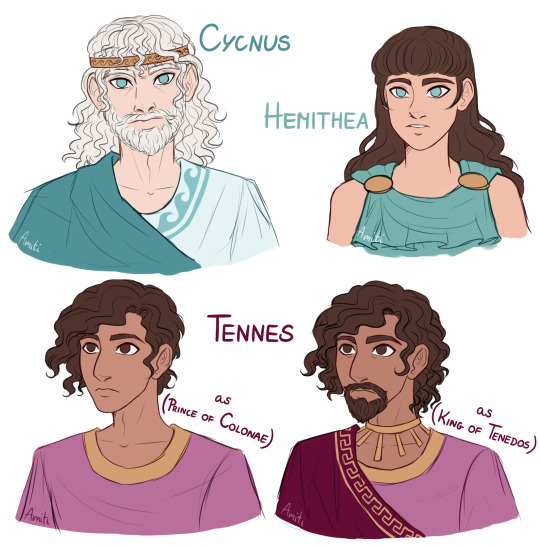
I posted about Troilus last week so I decided to clean up my old sketches of Tennes, his sister and their father for this week.
Cycnus was the king of Colonae (located near Troy) and the son of Posaidon. (His name means swan btw)
He married the princess of Troy named Procleia (she was either daughter or granddaugter Laomedon) and had 2 childern with her: Tennes and Hemithea. Some versions say that Tennes was son of Apollo and he was only being rised by Cycnus (this is going to be important later)
At some point Procleia died and Cycnus remarried. His new wife Philonome, fell in love with Tennes and when he regected her she told Cycnus that Tennes forced himself on her (or tried to). A flute-player named Eumolpus confirmed her version of events.
Enraged by this Cycnus put both Tennes and Hemithea in a wooden chest and throw them into the sea (some versions say Hemithea shared her brother's punishment willingly).
They made it safely to an island called Leukophrys (it was later renamed Tenedos) and become the new rulers of the land.
Cycuns somehow learned that his wife's accusations against Tennes were false so he buried her alived while Eumolpus (the flute-player) was stoned to death.
After founding out that his childern survived Cycnus sailed to Tenedos to ask Tennes' forgivnes and take them both home.
Tennes however didn't care for his apology and he cut the anchor ropes off the ship with an axe so Cycnus couldn't step on the land.
Tennes ruled his island for some time, he established a law which stated that the folse accusations were punisheble by death by an axe (Tennes really liked axes, didn't he).
Also flute-players were forbided from entering either the temples or the entire island.
Okay remember when I said earlier that Apollo was Tennes' real father and it was important? Yeah we're getting there.
When the Greeks were traveling to Troy they stopped on Tenedos. Thetis told Achilles that he can't kill the king of the Island because whoever kills Tennes will be killed by his father Apollo. Achilles however tried to force himself on Hemithea. Tennes tried to defend his sister but he was killed by Achilles. When Achilles realized who he killed he also killed his servant because the servant (who was sent to him by Thetis to remind him not to kill the king) failed to inform Achilles that he's about to kill the man he's not supossed to.
Some versions also mention a bigger fight and say that Tennes was also protecting his country. Most of the sources don't mention what happened to Hemithea afterwords but one text claim that she was swallowed by the earth which saved her from being violated by Achilles. Another says that she was killed by Achilles but don't mention anything about the assault.
It was forbidden to say Achilles name in the tample build after Tennes death.
Meanwhile Cycnus joined the Trojan forces and fought alongside Hector (who was his first wife's nephew btw, which means that Hector and Tennes were first cousins). Like his childern he was killed by Achilles, on the first day of the war.
#Tennes#Hemithea#Cycnus#Apollo#Troy#trojan war#achilles#greek myth art#greek mythology#Hector#greek heroes#greek gods#my art#character designs#children of apollo
213 notes
·
View notes
Text

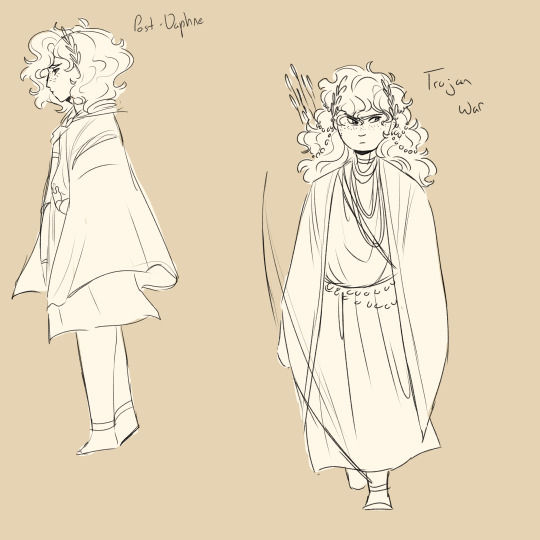



Apollo throughout the ages! Or at least from birth to Rome. I'm going to go ham on explaining the timeline under the cut, but I hope you guys like the designs I made for the different periods of his life!
Anyways EXTREME TIMELINE RAMBLING TIME
Baby (2591 B.C.E.): The year I arbitrarily decided Apollo was born in lmao. Apollo didn’t look like this for long. Probably only like, a minute. Just long enough for Leto to safely give birth and then he was immediately like “ew, no I wanna be big”
2. Fighting Python (2591 B.C.E.): Immediately after being born, Apollo flies off to go fight Python for 7 days (fun!). After that, he is punished for committing murder and has to purify himself by serving as a slave for 9 years in the Vale of Tempe (funner!) Yeah, Apollo definitely had an A+ childhood. One thing in his first two designs Apollo doesn’t look entirely human. This is bc I like to think he was born with some cool titan traits!
3. Pre-First Punishment (2582-2300 B.C.E): Back from his years in the mortal realm, Apollo looks much more human. His clothes are inspired by Ancient Aegean fashions I found, as we are long before the start of what is considered Ancient Greece. Apollo is the youngest member of the Olympian council and it shows. This boyish look stays with him until after he serves under Laomedon.
Other events that happen during this time:
Hermes is born (Around 2500 B.C.E.)
4. Post-First Punishment (2290-ish B.C.E-1500 B.C.E.): Apollo comes back from Troy influenced by their traditions, and it shows in his design. There wasn’t much I could find on how Troy differed from the rest of the Mediterranean at the time (probably bc for a while we thought the place didn’t even exist lmao) but I did find something that said an emphasis was put on those with higher status wearing jewelry. So Apollo gets pearls in his hair and golden bands around his arms. His clothes are inspired by feminine Aegean attire.
Other events that happen during this time:
Music duel with Marsyas (Around 2000 B.C.E)
Dionysus is born (Around 1600 B.C.E)
5. Post-Daphne (1500 B.C.E-1194 B.C.E.): The introduction of the laurel. After Daphne’s death, Apollo distances himself from his family a bit, which leads perfectly into our next big event-
6. Trojan War (1194-1184 B.C.E): Apollo sides with Troy, and its influence once again appears in his appearance, this time even more pronounced. In a war against not only Greece, but his own family, Apollo keeps himself covered and constantly prepared to aid in battle. Missing his mother back on Delos, Apollo grows his hair out for the first time.
7. Post-Trojan War and Hyacinthus (1184 B.C.E-776 B.C.E.): After Troy falls, Apollo sheds it’s influence quickly, not wanting to look like he’s supporting a side the rest of his family is either against or has given up on. He breaks his time evenly between Olympus and the mortal realm, and takes many lovers until the death of Hyacinthus around 800 B.C.E. After that, he stays up in the heavens for a few decades.
8. “Main” Apollo (776 B.C.E-540 B.C.E): Starting with the first Olympics in Greece, Apollo is lifted as a paragon of Greece and its people. Shedding the peplos he has worn throughout his early years, Apollo wears a classic chiton and becomes much more invested in the affairs of man. This is a period of great power and ecstasy for him, but as the saying goes, pride goes before the fall.
Other events that happen during this time:
Death of Niobe’s children (Around 770 B.C.E.)
Music duel with Pan (Around 750 B.C.E)
Dating Cyrene (Around 630 B.C.E)
9. Coronis-Asclepius (540 B.C.E-500 B.C.E): A design that only lasts as long as Asclepius lives. Zeus is unsettled by Apollo’s influence over Greece, and starts applying more pressure against him. This leaves Apollo stressed, and that's without the fact that he is now raising a prodigy in medicine alongside Chiron. In these 40 years, Apollo attempts to balance his want to be involved in the mortal world with his fathers wrath. In the end, his father will win.
Other events that happen during this time:
Around 515 B.C.E - Tarquin purchases the Sibylline Books. Apollo and the Sybil of Cumae must happen before this point (not entirely sure when yet, but definitely in this period.)
10. 2nd Punishment (500 B.C.E.): Apollo serves his second punishment under Admetus. Crushed by the loss of his son and anger of his father, Apollo spends most of this time in hiding. It is only through the gentle hand of Admetus that Apollo finds some sort of healing.
11. Late Greece (499 B.C.E-146 B.C.E.): Apollo is definitely trying to move on far too quickly from his punishment. He cuts his hair, dons his chiton, and gets right into being an Olympian. It doesn’t help that he is beginning to see the cracks in the foundations of Greece. Athens is flourishing, but only at the expense of Sparta and his own Delos. Years of civil war and threats of Roman invasion leave Apollo shaken, and he pulls away from both the mortal realm and his family, who seem more and more like strangers every day…
Other events that happen during this time:
Trophonius’ death (Around 200 B.C.E)
12. Fall of Greece (146 B.C.E.-32 B.C.E.): Rome officially takes over Greece, and suddenly Apollo’s family are all lost to him. As I’ve mentioned before, I don’t think Apollo has a Roman form like the rest of his family, and I imagine the sudden switch in their personalities must have been terrifying. Rarely worshiped and ostracized from Olympus, Apollo returns to the mortal realm, spending his time in solitude as a shepherd. As his influence grows weaker, he begins to show sign of weakness. This is the only time Apollo “ages” (I gave him a beard) and I tried to take away some of the attributes that would have been considered divine. Apollo is completely covered, and he wears shoes (which gods would never do)
13. Rome: (32 B.C.E.-476 C.E.): I know, I know, Apollo should have multiple Rome designs, but I got lazy. Apollo is credited by Octavian for his success in battle against Marc Antony and Cleopatra, and worship of the god skyrockets. Now back on Olympus, Apollo is still wary of his family’s Roman counterparts. He drowns himself in luxuries, hoping to distract from his worries about his brothers and sisters. Who knows what kind of bad decisions a man might make in this scenario?!? (*cough* Commodus *cough*).
And that’s my full timeline so far!! If there’s anything y’all have questions about (Any missing myths, questions about why I put things were) I’d be happy to answer! I put a lot of work into this, so I hope y’all like it!
598 notes
·
View notes
Text
one of the things that's really hitting me hard in this iliad reread is how during the battles nobody dies unnamed. we get inured to death in modern war stories, you know, we watch both sides slice through countless unnamed soldiers and the action only slows down when someone we recognize falls, but in the iliad everybody gets named.
and yeah, sure, now we don't know these people anymore but like. it's important. they are killed and here are their names, take a moment and remember
what really gets me is how many times the narrator pauses to give little asides when people die. like, where they're from, or who they're related to, or who they're friends with, or an attribute of theirs, a little something to make them human in the moment of their death (e.g. Pylaemenes, match for Ares, lord of the dauntless warriors with shields, the Paphlagonians and [his] driver, Mydon, whose father was Atymnius, who served bravely as his attendant)
and then there are the ones who get more, like this:
Then Diomedes, master of the war cry,
slaughtered the son of Teuthras, Axylus,
who used to live in beautiful Arisbe.
He had a rich estate and wealthy home,
and everybody loved him. He was kind,
and generous and welcomed everyone
who passed that way as guests inside his home.
None of his friends stepped in to help him now.
No one protected him from bitter death.
His life was taken.
or this:
Euryalus ... then chased
both Aesepus and Pedasus, twin brothers,
sons of Abarbarea. She, a naiad,
bore them to great Boucalion, who was
the oldest son of King Laomedon,
born out of wedlock. And Boucalion
had been out herding sheep when he had met
the water goddess and had joined with her
in love. They slept together. She conceived
and bore these twins. But now Euryalus,
son of Mecisteus, destroyed them both.
He took the life from both these handsome men
and stripped the arms and armor from their backs.
like hello????? suddenly the endless chorus of Name, Son of Name isn't rote or archaic convention, it's a reminder that this person will never see their family again. which then makes the rare times when someone goes on a rampage and mows through a whole list of names without pause (Athena turned his mind towards the crowd of Lycians, among whom he killed Coiranus, Alastor, Chromius, and Halius, Alcander, Prytanis, and Noemon) super chilling
it's so funny i expected to have feelings about hector (and i do) and all the things that destroyed me previous times (and i am!) but here i am stuck on Menesthius, who used to live in Arne. Phylomedusa with the oxen eyes bore him to lord Arethous, club-bearer
#the iliad#emily wilson's translation is also like ......... man#'his limbs unknotted' destroys me so much harder than 'struck him dead'
73 notes
·
View notes
Text
Pride was Theseus' fatal flaw.
He abandons Ariadne, the literal only reason he survived the labyrinth, because he feels he can do better or because he doesn't want to acknowledge that he couldn't defeat the minotaur and survive the labyrinth alone. He gets so caught up in his victory that he forgets to raise white flags so his (mortal) father knows he survived, and said father throws himself into the sea in despair and dies thinking his son is dead. Becoming King of Athens as a result of that, he becomes a tyrannical king because of his pride and because a toxic friend uses his pride to manipulate him. Where once he was brave and cared for other people, only attacking after first being attacked, after meeting Pirithous, he began doing dangerous and cruel things without thinking about the consequences of his actions. He becomes cruel and self-serving. He kidnaps a thirteen year old Helen of Sparta, intent on making her his wife (never mind the wife he already has) because she is a beautiful daughter of Zeus, the most beautiful girl on the Earth, who else would be worthy of her?, he thinks. He tries to help his friend kidnap Persephone, a goddess in her own right, so that they both can be married to daughters of Zeus, who could stand in their way? Hercules saves his ass from Hades' punishment, but even despite all of the above bullshit, the Gods still don't abandon him. Not until he murders his own son do they abandon him. He kills his son out of jealousy and out of pride. Now he's old, and his own people despise him, even the gods have abandoned him, so he decides to try and be a hero again. He fails. He's lost everything because of pride. Eventually, he is either pushed or he himself jumps (depends on the retelling) into the sea and drowns. If he was pushed, he was too proud and thought that he couldn't be tricked. If he jumped, maybe he was too proud to believe that his father had abandoned him, or maybe he realised his fatal flaw, realised the devastion that he left in his wake as a result and couldn't live with it.
Theseus represents the worst aspects of Poseidon. He's possessive, temperamental, violent, selfish, impulsive, and all-consuming. He doesn't take no for an answer. He's too proud. If Poseidon is anything, it's a prideful god. See the Odyssey, where he has a long vendetta against Odysseus for killing his son. See the Illiad where he sides the Greeks because Laomedon, the mortal King of Troy generations before Priam, Hector and Paris, promised a temporarily mortal Poseidon great reward for building the walls that would later protect Troy from the Greeks for over a decade, then when the task was done told him that setting him free is the best reward that Poseidon could hope for. Posedion took every opportunity to attack Trojan ships and even sent a blood thirsty sea serpent to terrorise the city. There's countless stories where Posedion's pride is the driving force behind them.
Pride is not all that Posedion is, but it's one of his faults.
Do you understand how significant his surrender is? Because I do and it's driving me insane. He sets it aside and he surrenders to his brother, a brother who once took his powers and made him mortal, the brother who is the very last person in the universe he would ever want to submit to. He does it to save Percy because Percy matters far more to him than his pride.
Posedion is one of the Gods who have grown the most since ancient times. He's no Saint and he will never be one, but he's calmed, he grown, he can now set his pride aside.
It's probably why Kymopoleia was banished (she deserves better from Rick because she is full of untapped potential and ngl hoo did her dirty and I can and probably will rant about it someday just not in this post), because she reminded Posedion too much of his dark side, a side he isn't indulging in as much because he's not conspiring to steal Zeus' throne, because as far as we know he doesn't have any vendetta currently ongoing (other than doing significant damage to Florida when Hera kidnaps Percy in tlh).
We do see Posedion set his pride aside for Percy in the books, in the last olympian when joins Zeus and Co in the battle, letting his own domain face destruction. Kronos doesn't expect Posedion to join Zeus & co because of his pride and he's both shocked and pissed that Posedion has done so. It wasn't part of his plan, he never considered that happening (which makes Hades showing up too so much sweeter). Percy had to ask him to do that. Seeing Posedion set his pride aside without a single word from Percy, who has closed his eyes and accepted his fate? I'M A FUCKING WRECK
#pjo#pjo series#percy jackon and the olympians#percy jackson and the olympians spoilers#percy jackson#pjo show#pjo spoilers#pjo tv spoilers#pjo tv series#posedion#posedion pjo#toby stephens#give him every award
42 notes
·
View notes
Text
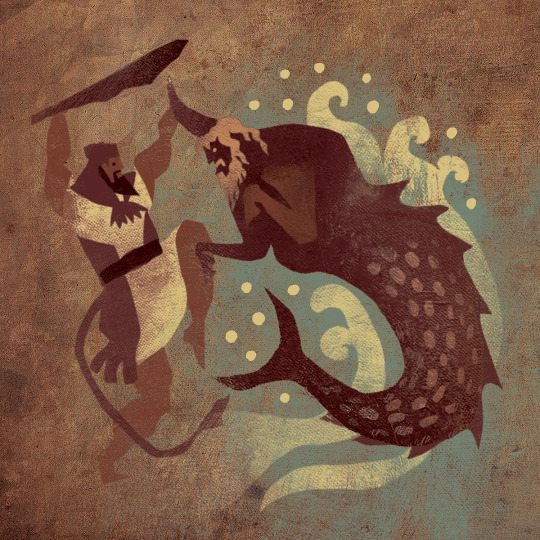
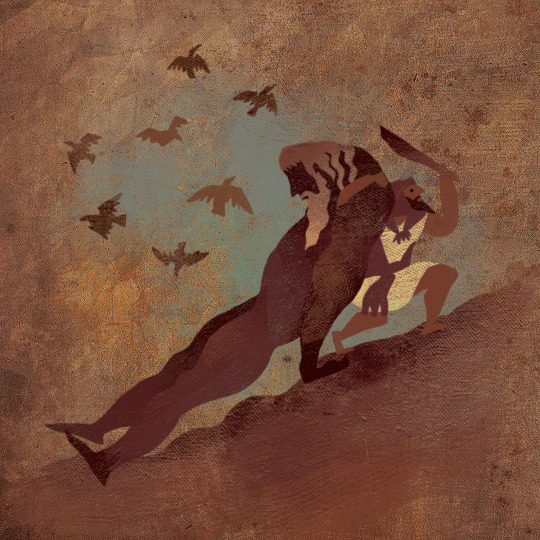
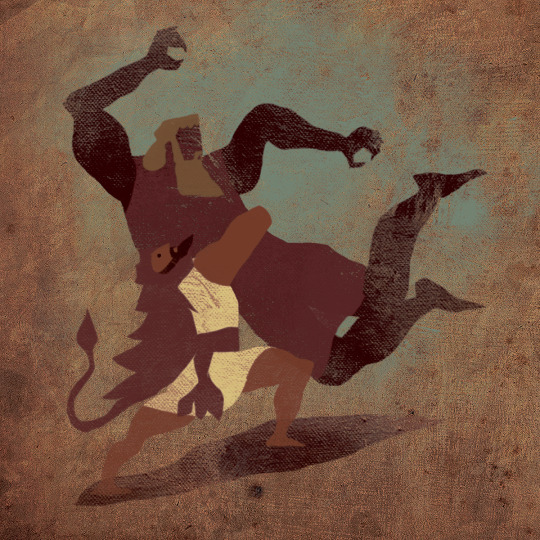
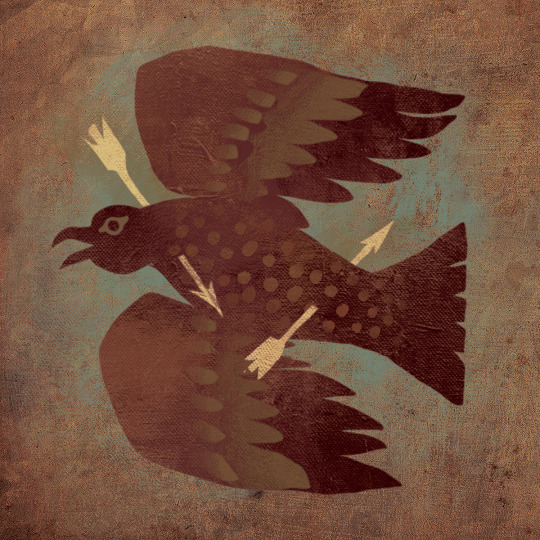
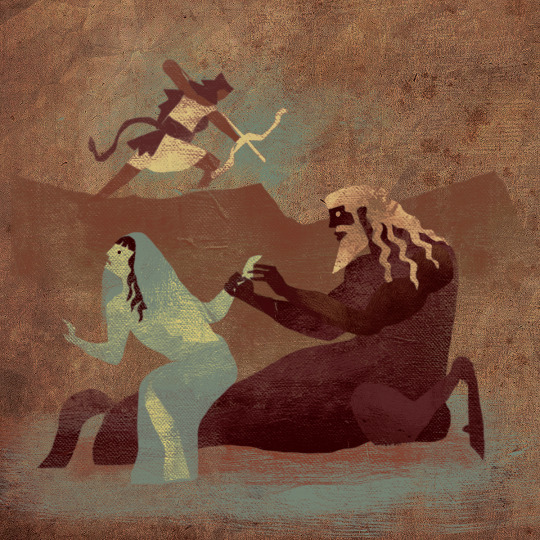
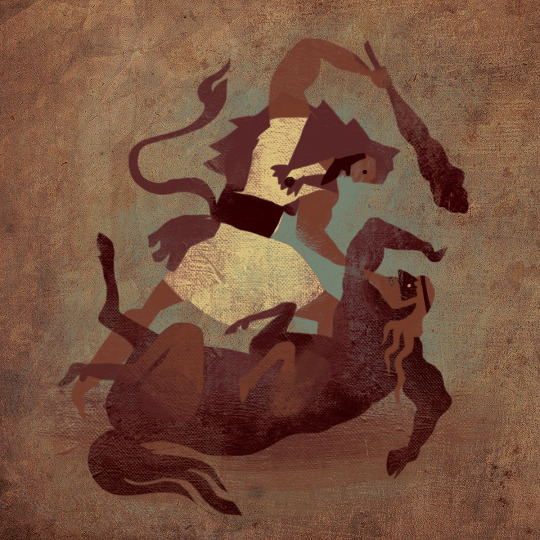
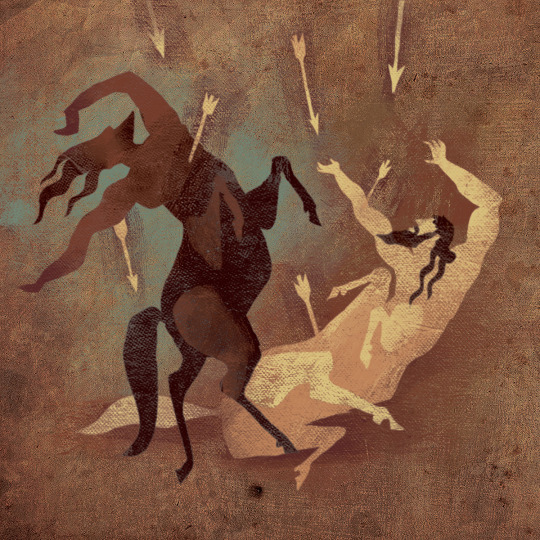
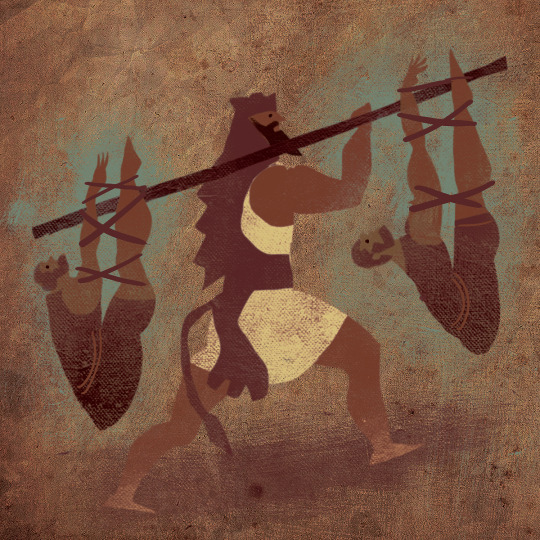
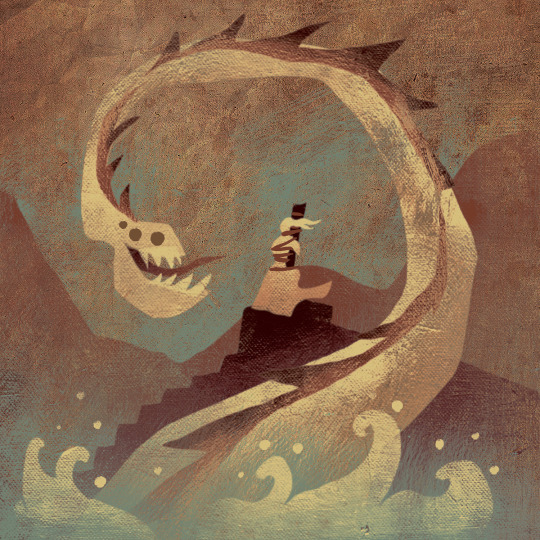
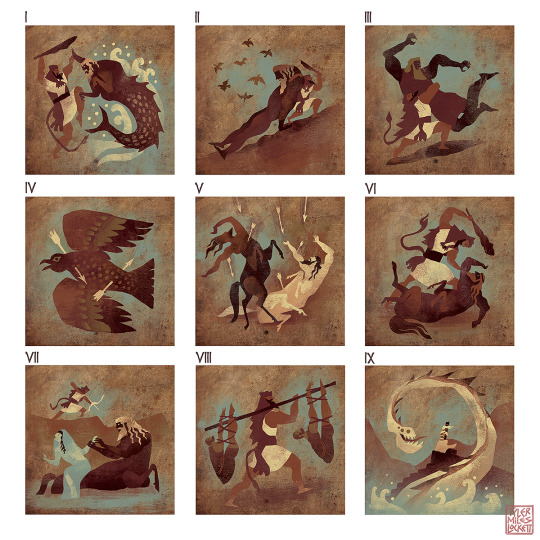
Heracles 10: The Paregra: Minor Labors
Heracles also performed Minor Labors, or Paregra (secondary work). As there is no definitive list of these, the following examples are some, but not all, of such labors.
Heracles wrestles the river god Achelous for the hand of Aetolian princess Deianeria. The god was often depicted as a man headed bull or merman. In the battle, Heracles tore off on of the god’s horns.
Heracles defeats the giant Alcyoneus during the Gigantomachy (war of giants). On the advice of Athena, Heracles drags the immortal giant beyond his homeland of Pallene, turning him mortal, and then defeating him. Alcyoneus 7 daughters threw themselves into the sea, but the gods turned them to kingfishers in pity.
Heracles defeats the giant Antaios in a wrestling match. The giant, who collects skulls of those defeated in wrestling matches, draws his power from Gaia earth, so Heracles lifts him off his feet and crushes his ribs.
Heracles shoots down Caucasian eagle, which fed on the titan Prometheus’ regenerating liver after Zues punished him for gifting fire to mankind.
Heracles kills the Arcadian Centaurs with poisoned arrows when they rush to drink the wine of the centaur Pholus. In the frenzy, Heracles accidently fells his beloved centaur tutor, Chiron.
Heracles slays the Centaur Eurytion, who threatens and dishonors Hippolyta at her wedding.
Heracles slays the centaur Nessus with a poisoned arrow after attempting rape against Heracles wife, Deianeira.
Heracles captures the Cercopes, a pair of trickster monkey or gnome like thieves in Lydia, and delivers the captives to his master, and later wife, Omphale.
Heracles slays the Trojan Cetus, and rescues the princess Hesione from the sea serpent sent by Poseidon in anger against King Laomedon.
#pagan#hellenism#greek mythology#tagamemnon#mythology tag#percyjackson#dark academia#greek#greekmyths#classical literature#percy jackon and the olympians#pjo#homer#iliad#classics#mythologyart#art#artists on tumblr#odyssey#literature#ancientworld#ancienthistory#ancient civilizations#ancientgreece#olympians#greekgods#hercules#heracles
180 notes
·
View notes
Text
Apollo's first two punishments must've been REALLY close together (for a god) because:
Apollo, Athena, Poseidon and Hera try to overthrow Zeus.
They fail, Apollo and Poseidon are sent down to serve Laomedon, king of Troy.
They build the walls of Troy. They leave
Heracles comes around and sacks Troy. Laomedon dies.
Asclepius does his thing, Zeus zaps him, Apollo kills the Cyclopes, Zeus sends him to Admetus as punishment.
Apollo falls in love, gets free, finds Admetus a wife and tricks the fates into letting Admetus live longer if someone will take his place
Heracles visits his two friends Admetus and Alcestis, the latter on her deathbed, and fights Thanatos.
Now, Laomedon probably wasn't that young, seeing as he had at least a dozen kids, so there could be a decade or two between when Poseidon and Apollo were there and when Heracles came.
Heracles also wasn't that young when he came across Admetus and Alcestis because he's done a number of things at this point including
Started a family, had seven kids, killed them. He's in his twenties.
Done his twelve labours, which would've been AT LEAST 10 years.
Gone halfway on a trip with the Argonauts.
Married AGAIN
Served under Dionysus for a bit
But STILL Apollo's punishments would've been in the same century, maybe the same 50 years. Which is crazy, actually.
18 notes
·
View notes
Text
I in general do kind of headcanon that Tithonos being taken by Eos is part of why Laomedon was so monumentally stupid in his treatment of Poseidon and Apollo.
BUT IMAGINE the additional anger if one goes with Euripides' implied parentage in the Trojan Women, where Ganymede is a son of Laomedon as well. First one son is taken, then the other, and then he has to deal with these gods?
Like sure, divinely built wall, awesome, and yes, he did get compensation when it comes to Ganymede but - still.
And then.
And THEN
some fucking Achaean barbarian has the STOMACH to demand that same compensation he was given for his son, as payment for his aid and not something more reasonable. I mean. I'd tell Herakles to get packing when he tries to cash in on the horses too, then.
(Like, again, I headcanon that Herakles asking for the horses even in the regular situation where Tros is the father is still highly rude and far too much to ask/demand for his help. But it gains extra verve if Laomedon is the bereaved father, no matter that Ganymede becoming Zeus' cupbearer is an honour. You've still lost a son.)
#ganymede#laomedon#tithonus#greek myth thoughts#I don't generally think of Laomedon as very sympathetic#but I also think he had some reasons for acting as he did#both with Poseidon and Apollo (as stupid as that is) and Herakles#ESPECIALLY Herakles tbh#because if the man just rolls up like#'yeah i'll help. if you give me the divine horses that was given as compensation for Ganymede :)'#like#fuck off??? lmao the fucking NERVE
14 notes
·
View notes
Text
TOA SECRET SANTA FICS
I wrote these fics for @literallyjusttoa this Secret Santa!
Enjoy!
(Note: go ahead and check out this year's secret santa! :D)
The first is Apollo & Poseidon (and Apollo/Ourea!)
The second is APOLLO/ADMETUS REJOICE IT HAS HAPPENED!
#my fics#save me 'cuz i'm fallin'#nothing else to give but love...#apollo#poseidon#laomedon#ourea#apollo x ourea#admetus#apollo x admetus#the trials of apollo#apollo fanfiction#toa fanfiction#trials of apollo
19 notes
·
View notes
Note
Aside from Hephaistion, who did Alexander consider to be his friends? Is there anyone who’s been noted as someone he was close to or fond of? Were they around his age, or older, like someone like Kleitus?
No doubt Alexander’s circle changed across his lifespan. Hephaistion appears to have been a constant, and a few others, but we get mention of new friends and acquaintances now and then, also fallings-out, or deaths.
First, we should note that each Macedonian prince was accorded an “official circle” called syntrophoi (σύντροφοι), selected by the king. It means “those who were raised together with,” e.g., schooled with Alexander. His cousin Amyntas would have had the same. (I’m thinking Arrhidaios probably didn’t, but he might have, depending on his actual mental capacity, which isn’t clear.)
If we can’t be 100% certain who were Alexander’s syntrophoi, we can make a few guesses. Perdikkas, Leonnatos, Marsyas, Hektor, Lysimachos, and Seleukos all seem likely—maybe even Kassandros (although he was younger). Probably Hephaistion, although one of the places Sabine Müller and I disagree is when he met Hephaistion. She thinks they met only as adults, whereas I think Hephaistion was a syntrophos. (I won’t go into why; I simply note it.)
The ruins of the palaistra near Mieza turns out to be much bigger than we expected, suggesting there were a lot of boys sent to study with Alexander—more by far than I included in the novel. But I’d already written Dancing with the Lion by the time that excavation occurred, and I’m not sure I’d change it even if I had known, as 100 kids is a lot to keep track of! I did note the size in the Historical Note, however, at the end of book 2. Obviously if there were even 50 (never mind the possible 100), they weren’t all close to Alexander. Probably most weren’t.
Some not syntrophoi, but important to his circle, include Krateros, Philotas, Nikanor, and Ptolemy, all of whom would have been about 10-ish years older, and may have been syntrophoi (at least some) of Alexander’s older cousin Amyntas. Erigyios, Laomedon, Harpalos, and Nearchos, despite my making them Alexandros’s age in the novels, were all almost certainly older, and perhaps by some years (more than Ptolemy and Krateros). Kleitos would have been like a big brother to Alexander, too, but not a syntrophos.
Now, OF those assigned syntrophoi, who were his actual friends? Good question. Keep in mind this is just my own opinion, based on my sense of things from the sources.
In addition to Hephaistion, he seems to have been genuinely fond of Hektor (Parmenion’s youngest). I think he also liked Lysimachos, and Perdikkas. Despite the hatchet-job Ptolemy (et al.) did on Perdikkas’s reputation in the Successor Wars, after Hephaistion’s death, Perdikkas occupied the highest position still at court (with Krateros his most trusted person away from court). I’m not sure if he were actual friends with Krateros, or simply recognized him as an excellent general, Parmenion’s natural successor. If they were close at some point, I can’t imagine the friction with Hephaistion made it easy to continue. For that matter, I’m not sure Hephaistion and Krateros weren’t originally at least friendly, if not friends. The tension seems to bloom late in the campaign after Hephaistion’s rise. Another possible friend was Marsyas, who had more of a literary career than a military one. But like Ptolemy later, he could have exaggerated his importance to Alexander for prestige.
There were also people in-and-out of his personal circle who weren’t Macedonians, or soldiers. We hear less about them. And we should remember that people’s personal circle does change across time. I think most people do probably count only a handful of people as consistent, long-term friends. That’s what makes them special.
Alexander’s unique place as crown prince, then king…then simply the most powerful person in his world, would have complicated enormously who he could call a friend.
It’s why I find his attachment to Hephaistion so fascinating—a unicorn—as it seems to have been both sincere and to have weathered his rise to power. It’s also why I think his own death followed so quickly on Hephaistion’s. It’s lonely at the top. A cliché, but very true. He got lucky enough to have a trusted partner who he brought along from the beginning. When that partner died, he was rudderless. Even if he trusted Perdikkas…Perdikkas wasn’t Hephaistion. Nobody was. That emotional devastation was heightened so much more simply due to his position.
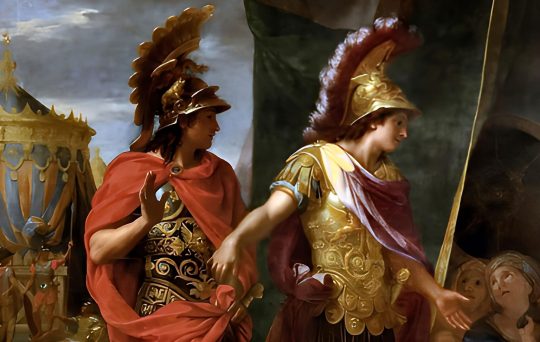
#asks#Hephaistion#Hephaestion#Alexander the Great#Alexander the Great's friends#syntrophoi#Macedonian court practice#Perdikkas#Krateros#Crateros#Leonnatos#Lysimachos#Marsyas#Hektor#Alexander's boyhood companions#Classics
46 notes
·
View notes
Text
ganymede, the cupbearer (asteroid 1036)
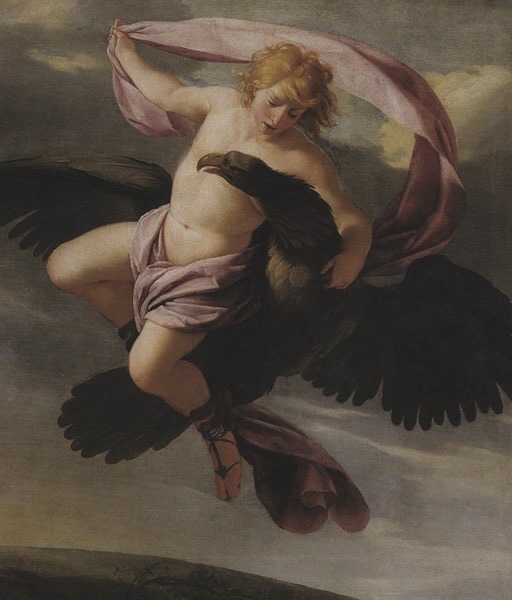
Ganymede is the son of the Trojan king, Tros,(sometimes referred to as Laomedon) and the Lady Callirhoe. Ganymede is famously known as Zeus's first male lover. In his eagle form, Zeus carried the beautiful boy to the heavens to be a cupbearer (in some versions, it is Minos who brings him to Zeus). Zeus pays Tros with immortal horses in exchange for his son. Ganymede is also connected to the constellation Aquarius; allegedly, Zeus turns the image of Ganymede into the constellation of the water-bearer to ease the pain of Ganymede's mother (get it? he was the nectar pourer). Ganymede's age is not explicitly noted in any myths, so, unfortunately, we can only assume he was rather young based on descriptions. And even more unfortunate, this is the first homosexual myth and it starts with the rape of Ganymede (thus the first act of pedophilia enacted by Zeus). In the turn of events there after, Zeus offers to make Ganymede immortal in order to serve the gods forever. Later, Ganymede falls in love with Zeus. IN MY OPINION Ganymed in your chart can represent a) where you are seen as too beautiful for your present situation, b) where you are taken away from home, c) where you break a pattern in your lover’s type, d) where you mark a beginning of an era, e) pedophilia and rape, f) stockholm syndrome, and/or g) homosexuality.
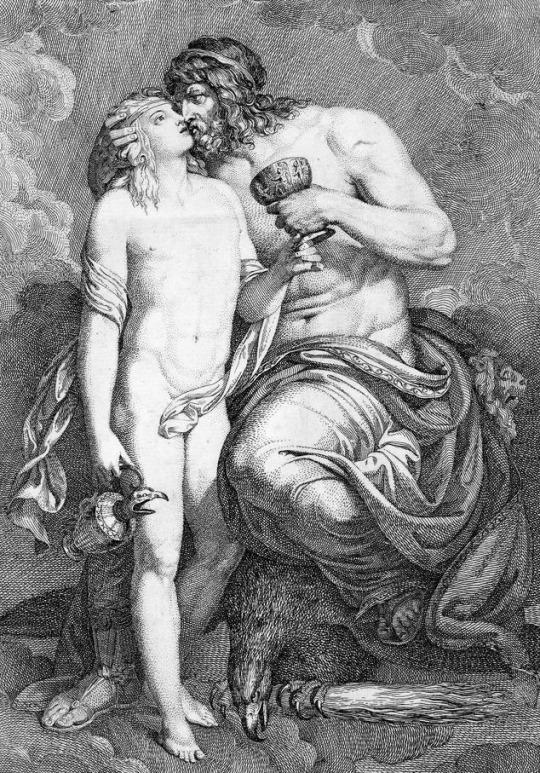
i encourage you to look into the aspects of ganymed along with the sign, degree, and house placement. for the more advanced astrologers, take a look at the persona chart of ganymed AND/OR add the other characters involved to see how they support or impede ganymed!
OTHER RELATED ASTEROIDS: tros (18281), laomedon (6997), zeus (5731 / h42), and minos (6239)!
like what you read? leave a tip and state what post it is for! please use my “suggest a post topic” button if you want to see a specific post or mythical asteroid next!
click here for the masterlist
click here for more greek myths & legends
want a personal reading? click here to check out my reading options and prices!
#astrology#asteroid astrology#astro community#asteroid#astro chart#natal chart#astro placements#persona chart#greek mythology#ganymede#ganymed#asteroid1036#minos#asteroid6239#zeus#asteroid5731
136 notes
·
View notes
Text
(2 of 2 fics)
MERRY CHRISTMAS PART 2! :D
Another fic [by @firealder2005] based off of the prompt list by @literallyjusttoa :3 This one is Apollo/Admetus, be it in older times or the modern day!
I will have this posted on Ao3 once the submission is up! :D
Warnings: I have this rated Teen & Up. Only warning is Apollo being rather depressed.
Also fluff alert! :3 This is Admetus/Apollo we’re talking about haha
ENJOY!
Nothing Else To Give But Love…
A soft nose grazed his hand. He shifted and absently began stroking the poofy wool on top of the sheep’s head.
Apollo hummed as the sheep’s baa echoed through the sleepy, spring-green field. Despite the mild warmth, he shivered, one hand nearly strangling the cords wrapped around his hand, the rest of the twine cinched about his waist.
The field was quiet. Simple. Nothing like Olympus had been during, or even before…before…
Before it had happened…
His son’s young face, blue eyes wide and startled as a clap of thunder rolled through the sky and electricity shattered the world around them leaving ���
Apollo took in a shuddering breath and squeezed his eyes shut, fighting back the tears welling in them.
Oh, Asclepius… He inwardly whispered. I’m so, so sorry, my sweet, sweet son.
He hadn’t deserved such a wonderful child — frankly, all of his children were marvelous and he couldn’t fathom what he’d done to deserve such bright kids. Apollo didn’t deserve them. He didn’t deserve Asclepius — hadn’t deserved him…
Apollo’s grasp on the cord loosened, letting the rough cords fall from his fingers. He raked a hand through his hair, the locks empty without the laurel wreath usually nestled in them. He hadn’t been casted down to Earth with it the first time, and it was no different now.
He shamefully missed the weight of the crown in his hair. The guilt he made himself carry day in and out. Never letting himself forget her.
Her. Another person he hadn’t deserved…
Did he deserve anything? He, the most glorious of gods…but now nothing more than a mere servant. A shepherd.
(Not that there was anything wrong with shepherds, mind you. He was the god of them, and had dated a few. Branchus had been a beloved lover, and the person who made Miletus one of Apollo’s favorite cities.)
And what made it worse…he was here because of his own actions. His father’s enraged expression was still fresh in his mind, though the memories were tinted red by his own fiery, destructive fury.
Actions have consequences, my son, Zeus’s voice winded its way through his head. Even you are not above the law.
So here Apollo was. Laying in a field, dressed like a servant. Deprived of even more divinity than he’d had the first time he’d been casted down to Earth to work for Laomedon (the name made him shudder). He thought he felt mortal during his time in Ilion — or Troy, as it was now called. For the first time, his hands had ached. He experienced fatigue and thirst.
Last time was nothing compared to now. By the end of the day, he was exhausted. It was harder to access his divine power to keep himself awake at night, even if dear Admetus attempted to get him to go to sleep, insisting it was natural to need rest after a long day.
But he couldn’t — Apollo didn’t need to rest. He was a god, he could go centuries without rest.
It was only temporary, after all.
(He ignored the yawn that tugged at his lips. The heaviness of his eyes.)
(Temporary. All temporary.)
Footsteps made his head turn. Apollo subconsciously brought a hand up to his hair and played with a strand as he caught sight of Admetus coming closer. Handsome face, dark, soulful eyes and equally dark hair. Stubble grew on his perfect jaw.
Apollo felt his heart flutter when the king softly smiled at him.
He straightened when Admetus slid down beside him, patting the sheep lazing on his other side on the head as he looped an arm around Apollo. The god leaned against him and rested his head on his shoulder, humming happily when Admetus placed a kiss on his hair.
“Slow day?” the king murmured against his hair.
Apollo shrugged, fighting back a yawn. “Pretty much. I think the wolves and bears have decided to go elsewhere.”
“They bow before their lord,” Admetus grinned. Apollo giggled into his shoulder. “As they should.”
The god chuckled again, though a slight sigh shivered through his body. “Not now, though,” he murmured. “I’m not their lord now.”
Admetus stroked his hair. Apollo could almost imagine the concerned tilt of his head, the slightly raised right eyebrow as he looked at him.
The king hummed, resting his head on Apollo’s. “They seem to think so,” he softly observed. “They still listen and obey you.”
Apollo shuffled his legs and buried his face further into Admetus’s robes. A hand ran through his hair again, gently working at small knots, before it was removed and Admetus shuffled around himself.
Peering up, Apollo blinked as the king slid off his light cloak, shook it out, then swung it around Apollo’s shoulders and gently fastened the clasp. Apollo raised his hands to Admetus’s, protesting; “You don’t have too—”
“I insist.”
“Really, I’m fine.”
Admetus kissed his forehead and pulled Apollo into a warm, firm hug. The god gratefully sank into it, eyelids fluttering as sleep tugged on his consciousness. He squeezed his eyes shut and mentally shook himself awake. No sleeping, he ordered himself. Especially not when a handsome king is hugging you!
“You have a lot on your mind,” Admetus murmured. “Don’t you?”
Apollo sighed. “Yes,” he admitted. “I do.”
Admetus stroked the back of his neck, which felt really nice. “Anything I can do to help lighten your load?”
The god softly laughed and rubbed at his heavy eyes. “I don’t know,” he said, pulling away slightly and looping his arms around the king’s neck. Their noses brushed against each other. “Not now, anyway.”
The king cupped his cheek and rested his forehead against Apollo’s. Apollo hummed with contentment at the gesture.
“I have something for you,” Admetus bashfully whispered. Apollo stroked the stubble on the king’s chin and blinked slowly at him, a small smile pulling on his lips at Admetus’s flustered expression.
Admetus reached into his exposed robes and withdrew a circlet.
The first thing that caught Apollo’s attention was the color. A thick, lush green. Shining in the soft, sleepy sunlight.
Bay laurels.
A laurel wreath.
Hesitantly, Apollo allowed his fingers to brush over the delicate leaves before withdrawing. “I…I can’t. I’m not —”
“A prince?” Admetus quietly supplied. He used his free hand to gently pull Apollo to his feet, adjusting the cloak around him, before placing the wreath in his long, unfurled hair, fingers tracing the skin of his cheek.
“Admetus —”
“Keep them on, my prince,” Admetus whispered, placing a light, loving kiss to Apollo’s forehead. “You’re just as royal as I am.”
Apollo gazed up at him, blinking rapidly as his blue eyes got suspiciously wet. He didn’t deserve this gift, especially from Admetus. He wasn’t worthy of it, of a crown made from the leaves of a woman as great as she had been.
But…Admetus seemed to think he did. A corner of his lips curved into a shy smile. Oh, Admetus… he wistfully thought. You somehow see something good in me.
Before he could stop himself, Apollo surged up and kissed Admetus on the lips. His hands trailed up into the king’s dark hair as Admetus drew him close. Apollo felt his heavy eyes flutter shut, relying on his other senses to navigate the wonderful kiss —
Before he blinked back into awareness, staring bewilderedly into Admetus’s perplexed eyes.
“Um. Hi,” he squeaked. Admetus had caught him in a dip, holding him over the ground below them. Apollo had to admit, it felt quite nice. Though how did he end up in this lovely position?
“Hi,” Admetus chuckled. “You…passed out there, for a moment.”
Apollo felt his face burn. Oh dear, sweet Ouranos…how embarrassing. Did he really just pass out while kissing? His breath stuttered as he avoided meeting the king’s mirthful eyes.
“Did I steal too much air?” Admetus grinned. “Or did you just fall for me?”
Apollo slapped his chest and burst into laughter. “That was so bad,” he snorted, smiling brightly from ear to ear.
“I know,” Admetus’s grin was still beaming. “But it’s worth it to see you smile.”
Apollo bashfully ducked his head, laughing once more when Admetus scooped him into his arms and grin brightly.
“Now, however,” Admetus began. “You should rest. You’ve barely been sleeping.”
Apollo looped his hands around his neck and laid his head on Admetus’s shoulder. “I’m fine,” he murmured, eyes fluttering. He snapped himself awake. “I’m a god, Admetus. I don’t need sleep.”
Admetus hummed in disagreement, beginning to walk back to Pherae’s palace with Apollo still nestled comfortably in his arms. “But you’re deprived of much more divinity this time,” he wisely pointed out. “And that means, you do need sleep.” The king paused and rested his forehead against Apollo’s, adding quietly; “I would never make you do something you don’t want to, but please,” he implored. “Go to sleep. You need it.”
The god huffed before sheepishly smiling. “What about the flocks?”
“I have a feeling they’ll be fine,” Admetus assured him with a grin. “The message that the god of flocks is protecting this place should have gotten around by now.”
They both shared a light chuckle before Admetus softly kissed Apollo. He leaned into the feeling, feeling a soft thrill of contentment ripple through his being, before murmuring; “Alright. But only if you join me.”
Admetus softly laughed. “If that is what you wish, my prince.”
----------
Admetus glanced at where Apollo laid sprawled beside him beneath the covers. The blanket had slipped off him, and Admetus carefully pulled it back up, brushing Apollo’s golden hair out of his face as he did.
Finally, he was getting some rest.
Apollo was a stubborn god, and seemed convinced he didn’t need the necessities mortals did — food, water, sleep — and Admetus had used every trick in the book to get him to pay attention to the very human needs he now had.
Well. Almost every trick.
He absolutely refused to use the control Zeus gave him over Apollo. Absolutely not. It horrified him that the wise and just king of the gods he’d spent his life honoring would just give a complete stranger the ability to manipulate his own son any way they liked.
Admetus had always carefully crafted his words to leave Apollo the opportunity to refuse an order if he so chose — a loophole, if you will. Ironically, he never did except for when Admetus wanted him to listen, like actually sleeping instead of making cheese in the dead of the night.
Sighing fondly, he gently ran his fingers through Apollo’s hair, mindful of the laurels now nestled in them. It felt like the soft silk that came from the East.
It scared him, sometimes. This temporary bond between them. Admetus found himself second-guessing his words before speaking, fretting over the possibility of accidentally using it against Apollo…
He had no desire to force this beautiful being into anything — especially since they became lovers.
Admetus wasn’t a fool. He was very well-aware of the power dynamic between them, and did his damndest to even the field as much as possible. He had never used the control he had against Apollo, and he never would.
And for that matter, why should he? Yes, Apollo was technically in his service and therefore legally and divinely bound to obey him, but he was his own person too. He had his own personality and quirks.
Like making cheese in the dead of the night, Admetus bit back a chuff at the memory, a smile stretching across his face as he tucked his chin over Apollo’s hair. He remembered that moment well. Apollo with jugs of fresh sheep milk, carefully taking the curdled bits and brining them, letting the cheese soak in the liquid.
His face had been pinched, a slight frown on his lips, but his movements had been precise and smooth, as if he’d been making cheese his whole life.
And well. Considering Apollo was the father of Aristaeus, Admetus could believe that.
Apollo had sheepishly admitted to not being able to sleep that night, smile strained as thunder rolled outside, lightning and a simple beeswax candle their only source of light in the darkness. Instead of urging his beloved back to bed, Admetus had dropped down beside him and gently unpinned his hair, letting the frayed, golden locks free and began to braid them.
They had sat there the rest of the night, in quiet, comfortable silence, though it was occasionally interrupted by a thunderclap or flash of lightning. Apollo flinched a few times at these, prompting Admetus to twine their hands together once he finished the Athenian hairstyle.
In response, the divine herdsman glanced at him, a soft smile lighting up his beautiful features, before it curved into a mischievous look.
“What are you—?”
Apollo looped his arms around his neck and slid onto his lap, eyes sparkling with mirth. “Care for a bite?” He impishly asked, freeing one hand to scoop up a platter of freshly-made cheese.
Admetus raised a brow, lips twitching, as he asked; “Did you slip something in it?”
Apollo scoffed. “Of course not,” he placed his unoccupied hand to his chest, as if offended. “Only the finest of cheese for my favorite king.”
“And only the finest of the gods could ever make it,” Admetus teased, accepting the offered cheese platter, only to pause when Apollo clucked his tongue and nimbly plucked a piece up himself.
“Allow me,” his smile softened from teasing to genuine. “Least I can do for your kindness.”
Admetus chuckled awkwardly. “It’s nothing,” he shook his head. “I do think this world could use a little more kindness.”
Apollo hummed. “I suppose you’re right,” he softly said, offering his hand with the cheese out. “Taste?”
Admetus didn’t break eye contact as he ate the cheese from Apollo’s fingers, cupping the god’s hand as he did. The tangy, rich flavor bathed his tongue and he licked his lips.
“Delicious,” the king proclaimed, snagging another off the platter. “You truly make the best cheese I’ve ever tasted.”
Apollo laughed as he ate a bite of cheese himself. “Ah, then you truly have yet to live,” his eyes danced in the darkness. “Remind me to get you some of Aristaeus’s — he is the true master of cheese-making.”
Admetus smiled and kissed Apollo’s cheek, comfortably wrapping his arms around his waist. “I shall await this marvelous cheese,” he whispered against his beloved’s ear. “But for now, I’m very much content with yours.”
Apollo’s bashful duck of the head sent flutters of warmth through him.
Sighing fondly at the memory, Admetus nosed into Apollo’s warm body beside him, breathing in the scent of laurels, glancing momentarily at the wreath still laying in Apollo’s hair. It sat crookedly, the leaves unused to being crushed under the head of a human.
Delicately, Admetus adjusted the wreath until it sat mostly straight, though there wasn’t much he could do about the crumpled leaves. Some golden strands had fallen back into Apollo’s closed eyes.
Even without a crown, he silently thought to himself as he brushed those strands away. He’ll always be royal to me.
—
My ramblings on ancient greek CHEESE can be found on Ao3 :3
#submission#toasecretsanta#firealder2005#literallyjusttoa#trials of apollo#toa#trials of apollo fanfiction#riordanverse#riordanverse fanfic#pjo apollo#pjo admetus
46 notes
·
View notes
Text
From what I've seen, Poseidon generally seems to be considered a very temperamental and impulsive god, maybe the most temperamental and impulsive of all his siblings, but in the Iliad at least that is not how he is characterized and in fact we even have some instances where he advises caution to his sister Hera. If anything, she is far more temperamental and impulsive than him in this poem.
In Iliad VIII we have this interaction between Hera and Poseidon: "… lady Hera was angered, and started on her throne, shaking great Olympus, and she addressed the great god Poseidon: 'oh me, Earth-Shaker, wide-ranging in might, does not your heart in your very breast feel for the Danaans who are dying? They bring gifts for you up into Helike, and Aigai too, many of them and pleasing; you used to wish them victory. If only we were willing, we who aid the Danaans, to thrust the Trojans back and check far-thundering Zeus, then he would be sorry sitting there alone on Ida.' Then greatly troubled the lord Earth-Shaker addressed her: 'Hera, reckless in speech, what kind of word have you spoken? I would not wish for the rest of us fight with Zeus the son of Cronus, since he is far the stronger.'". Keep in mind that shortly before this Zeus had ordered all the gods to stay away from the battle and had threatened with severe punishment anyone who would offer assistance to either the Achaians or the Trojans.
In Book XX, it is again Hera who incites the gods to action and Poseidon the one who advises to wait and not do anything rash: "Nor did the son of Anchises escape the notice of white-armed Hera as he set out against the son of Peleus through the throng of men, and she, summoning the gods together, made a speech: 'Consider you two, Poseidon and Athena, in your minds, how this matter will be. Here comes Aeneas armed in gleaming bronze against the son of Peleus, and Phoebus Apollo sets him on; come, let us turn him back on the spot; or rather let one of us stand by Achilles, and grant him great strength, so that he does not fail in spirit, and so he may know that the best of immortals love him, and the other gods are so much wind, they who before warded off the battle host and fighting from the Trojans. …' Then answered her Poseidon who shakes the earth: “Hera, do not rage beyond reason; you should not. I myself would not wish us to drive the other gods together in strife, since we are much the stronger, so let us go aside from the haunts of men and seat ourselves upon a lookout point, and let the war be the concern of mortals. But if Ares starts to fight, or Phoebus Apollo, or if they should keep Achilles back and not let him fight, there and then the strife of battle will arise from our side too. …'"
Also compare the difference between the way Poseidon and Hera conduct themselves in the battle of the gods in Book XXI. While Poseidon encourages Apollon to attack first, being the younger, and reminds him of the insults they both suffered by Laomedon, Hera doesn't wait for Artemis to actually do anything or even talk to her before she hits her with her own weapons and makes her run away in tears.
There are some other instances in the Iliad where Poseidon shows himself to be more cautious and sensible than his reputation suggests. In Book XIII, when Zeus turns his gaze away from the battlefield, Poseidon takes advantage, revitalizing and inspiring the Achaians to fight. However, he takes care to do so secretly and in human guise because he recognizes that Zeus is older and more knowledgeable than him. In book XV, Poseidon is certainly angered by Zeus' attempt to bully him into submission and reacts to the message he receives with harsh and bold declarations, but he recognizes the wisdom in what Iris says to him and does relent and obey eventually even though he considers himself equal to Zeus in honour.
7 notes
·
View notes